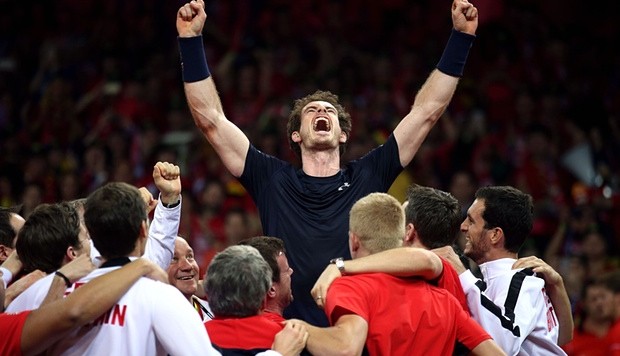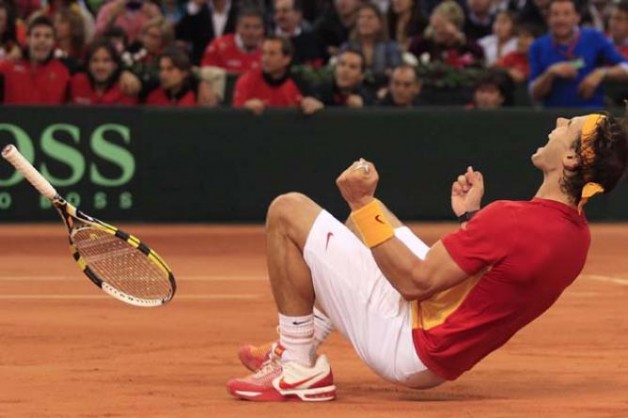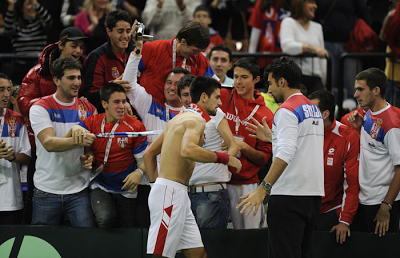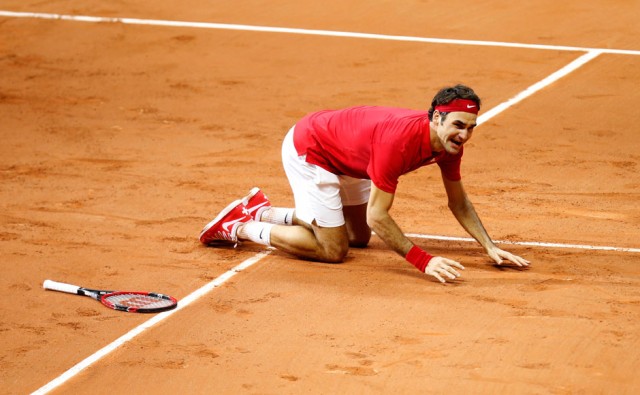If you traveled 80 years into the past, you would have traveled into a world which — in tennis terms — featured Great Britain as a foremost tennis nation, not a peripheral player on the scene.
In 1935, the part of the world which birthed the sport of tennis was also the best at playing it in both singles and doubles. Great Britain, from 1933 through 1936, won four straight Davis Cup titles, and made a fifth straight Davis Cup Final in 1937. Fred Perry ruled tennis in the mid-1930s, just before Don Budge of the United States wrested that distinction from him in the latter part of the decade.
Before the British press spent decades typing, “It’s been ___ years since Fred Perry last gave Great Britain a champion at the Davis Cup (or Wimbledon, or at any major),” Perry was dominating tennis in the present tense. Yes, there once was a time when the Brits ruled the roost. Perry and teammate Bunny Austin made Great Britain as formidable as it had been in the first decade of the 20th century (and the Davis Cup itself — the event began in 1900), when the Doherty brothers, Laurence and Reginald, gave the British Isles (as they were then called) a head start in the trophy count.
Great Britain’s success in Davis Cup in the first 37 years of the tournament enabled the nation to collect nine championships. Who could have known, almost 80 years later, that the home of Wimbledon and lawn tennis would still sit on those nine titles through a vast expanse of tennis history? Who could have known that Great Britain would go 78 years with only one appearance in the Davis Cup Final (1978)? Who could have known how long this nation would need to wait for its next male champion at a major tournament and at Wimbledon, and for its next Davis Cup trophy-holders?
James Ward won a huge singles point for Great Britain in the 2015 Davis Cup first round (against John Isner and the United States). Without that one point, the Americans’ primacy in doubles with the Bryan Brothers would have given them a great chance to eliminate the Brits in round one.
Jamie Murray won three doubles points for Great Britain over the course of four Davis Cup rounds. His contributions to this team were nothing less than substantial. Winning with his brother is and will always remain a highlight of his life and career in tennis, right there with his appearance in the Wimbledon men’s doubles final this past summer.
Yet, about that brother: Andrew Barron Murray is the man responsible for Great Britain’s tenth Davis Cup, won Sunday evening in Ghent, Belgium.
Murray defeated David Goffin in the reverse singles rubber, enabling the Brits to defeat the host nation, 3-1, in the best-of-five competition. Belgium was making its first appearance in a Davis Cup Final since 1904, but it failed to win the maiden title Switzerland captured last year behind Stan Wawrinka and Roger Federer.
*
Murray is a comprehensively superior player in relationship to Goffin. Of that, there is no doubt. For this reason — and because the other singles players in the competition do not carry especially impressive credentials — this Davis Cup Final didn’t pop the way other sexier confrontations have managed to do. The tennis world has seen greater and more enthralling mountaintop encounters in its revered international competition.
Due to the dynamics at work in this year’s competition — which have often existed in other ones as well — Davis Cup is and has been easy to ignore (or at least downgrade) for a lot of tennis fans. The centrality of the doubles match — the middle (Saturday) hinge point in this five-match festival from Friday through Sunday — also makes Davis Cup a little more peripheral for a subsection of tennis watchers.
You can rattle off all the explanations or caveats or qualifiers — for some, Davis Cup will never be as big as the majors. In terms of an American media spotlight, this will always be true, since college and professional (American-style) football always reach the busiest points of the season during a weekend traditionally reserved for the sport.
Yet, when you see an accomplished champion of tennis react with such joy and depth of feeling to a championship that is meant for a nation more than an individual, it becomes apparent just how much Davis Cup means to the participants. More precisely, it becomes apparent just how much Davis Cup means even to the men who have done it all (or done almost everything else) in tennis.
Rafael Nadal, of the four preeminent male tennis players of this era, is the most accomplished Davis Cupper, with four championships for Spain. Novak Djokovic won this event with the Serbian team in 2010. Federer won it in 2014. All of these men — albeit with differing levels of passion at various points in their careers — felt enough of a call to make Davis Cup worth the journey. More revealing is the reality that they all reacted with great feeling when they won:
Nadal:
Djokovic (who did not clinch Serbia’s title in 2010 over France — Viktor Troicki did — but still ripped off his shirt afterward, which tells you how big a deal it was):
Federer last year:
Now, you can see Murray in the cover photo for this story, above.
One more pair of images appears below:
That's what it means [getty] pic.twitter.com/s3qae03Yc2
— José Morgado (@josemorgado) November 29, 2015
The enduring meaning of Davis Cup — its power to capture not just the hearts of fans, but the hearts of players who have won multiple major titles and have spent many years as world-weary professionals — remains a central story of the past weekend in Belgium. It remains a central story of Andy Murray’s win, rounding out the Big Four’s Davis Cup tour and giving a measure of poetic completeness to this historic era in men’s tennis.
*
This story cannot end, however, without circling back to the beginning.
Great Britain — sitting on nine titles for 79 years — now has that 10th title. Based on the feats of the Dohertys and Bunny Austin and Fred Perry, that total is third all-time, behind the United States (32 titles) and Australia (28). France moves down to sole possession of fourth place on the list, with seven titles.
The simple numbers are staggering, but they add so much to Andy Murray’s place in the history of British tennis, British sport, and tennis at large.
The 79-year Davis Cup drought for Great Britain? Gone.
The 77-year Wimbledon drought for British male singles players? Gone.
The 76-year major-tournament drought for British male singles players? Gone — at the 2012 U.S. Open.
Andy Murray has ended three sports droughts which all lasted longer than the period since the Chicago Cubs’ last appearance in a World Series. He has ended three sports droughts which have lasted at least a quarter of a century longer than the period of time since the city of Cleveland’s last major pro sports title (in 1964).
Andrew Barron Murray might not be accorded the same place in history as his three more accomplished contemporaries from Spain, Serbia and Switzerland. He might sometimes exist in a separate realm from the Big Three.
Yet, moments and accomplishments such as this one in Belgium remind us how great Murray’s career has been and continues to be… with more milestones being added not just to the trophy case, but to a storehouse of memories which is infinitely richer today.
Andy Murray is the rain dancer, the one who ends long tennis droughts.
He, Jamie Murray, and James Ward are also the reign-makers of a nation after Great Britain’s tenth Davis Cup.
Rule, Britannia.




